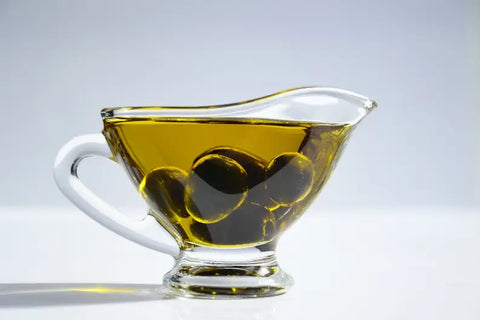Olive Oil and Olives for Type 2 Diabetes

Olive oil, particularly extra virgin olive oil, is well-known for its numerous health benefits, ranging from inflammation reduction to blood sugar balance to cardiovascular health promotion. Olive oil lowers the risk of cardiovascular disease, aids weight loss, prevents strokes, and reverses Alzheimer's disease-related memory loss. Its high concentration of monounsaturated fats (or MUFAs) and polyphenol chemicals allows it to provide these benefits.
Polyphenols are bioactive substances found in plant-based foods like olives and olive oil with significant antioxidant and anti-inflammatory qualities. Monounsaturated fats, including oleic acid, are a subtype of unsaturated fats that are highly anti-inflammatory and maintain blood sugar control. Hydroxytyrosol, oleuropein, and oleocanthal are the most common polyphenols found in extra virgin olive oil.
Extra virgin olive oil is one of the most acceptable fats for anyone trying to avoid or control type 2 diabetes because of these beneficial ingredients.
What is Diabetes Type 2?
Type 2 diabetes is a disease that affects how your body converts food into energy. More specifically, it's a problem with how your liver metabolizes sugar (or glucose) for fuel, resulting in excess blood sugar.
Chronically increased blood sugar levels can eventually contribute to severe complications, including heart disease, eyesight loss, poor wound healing, and nerve damage if type 2 diabetes is left untreated.
Lack of activity, being overweight, having a high percentage of body fat, and eating too much sugar and refined carbohydrates are all risk factors for type 2 diabetes. Adopting healthy diet and lifestyle habits, including weight management with natural supplements like curaslim, to eliminate these risk factors is a smart way to prevent, manage, or even reverse type 2 diabetes.

Olive oil and type 2 diabetes
There are three varieties of olive oil: refined, virgin, and extra virgin. For diabetics, extra virgin olive oil (EVOO) is regarded as the healthiest option.
How Can Olive Oil Assist Diabetes Management?
While diabetes has no cure, it can be prevented or managed by decreasing weight, eating a nutritious, nutrient-dense diet, and staying active—and in some cases, these healthful changes are enough to put type 2 diabetes into remission.
For a variety of reasons, olive oil, particularly extra virgin olive oil, is an excellent complement to a diabetes-friendly diet:
According to studies, adding extra virgin olive oil to a meal with a high glycemic index lowers the body's glycemic reaction. The polyphenol oleuropein found in olive oil has properties that lower blood sugar levels in animals. Studies suggest that monounsaturated fats have a favorable impact on blood sugar levels and insulin production compared to saturated fats.
Extra virgin olive oil is also beneficial for long-term blood sugar control. People who consumed the most olive oil had a 16% lower chance of acquiring type 2 diabetes, and substantial decreases in fasting blood sugar and HbA1c levels, according to a 2017 meta-analysis. A number of studies also indicate the benefits of a Mediterranean diet in lowering the risk of type 2 diabetes and improving general metabolic health.
Olive oil might also aid weight loss. Women with excess body fat who added 1.5 teaspoons of extra virgin olive oil to their meals lost considerably more weight and had lower blood pressure than women who consumed the same amount of soybean oil, according to a new study. Given that fat cells are known to generate proinflammatory cytokines that can lead to insulin resistance and harm pancreatic islets, this is fantastic news.
Finally, extra virgin olive oil chemicals have been demonstrated to lower inflammation and oxidative stress, two variables linked to diabetes and its effects.

How to Use It?
Are you unsure how to use olive oil? Here are a few methods to include this beneficial oil in your diabetic diet.
- Olive oil can be used instead of butter and ghee.
- Serve with toasted bread.
- Use olive oil to dress your salads.
- Instead of using ordinary cooking oil, sauté, roast, grill, or prepare vegetables with olive oil.
- A spoonful of olive oil can also be consumed. Some individuals in the Mediterranean drink 40 cc of olive oil every morning with their breakfast.
How do you choose the best olive oil?
Three liters of olive oil require approximately 40 kg to 45 kg of olives. That is why olive oil is more pricey than other edible oils. It's crucial to understand that not all olive oils are created equal.
The product should not be stored in clear or transparent bottles. A dark glass bottle should be used, this stops light from accessing the olive oil, which aids in oxidation and the breakdown.
Never keep olive oil on the stove, in the cupboard above the stove, or with a loose cap. Allowing heat and oxygen to contact olive oil can cause it to oxidize. Keep it cool, dry, and in the dark.
Cold-pressed olive oil is known as extra virgin olive oil (EVOO). The olives are crushed and oil extracted at a temperature below 80 ℉. This type of olive oil is not heated throughout the production process and does not require further refinement. The finest quality olive oil is extra virgin olive oil. It is chemical-free and unrefined. It's perfect for salad dressings and bread dipping.
The polyphenol content of fresh olive oil is stronger than the health benefits. Look for bottles with a harvest date on the label and purchase within 15 months. If you are preparing food with olive oil, avoid heating it at high temperatures. That way, you will aid in preservation.

Olives and type 2 diabetes
When it comes to diabetes management and overall health, olives are considered a superfood. Olives are little fruits that grow on the same-named trees. Drupes, often known as stone fruits, are a type of fruit. Mangoes, peaches, cherries, and other fruits come into this category as well.
Olives provide numerous health benefits.
Olives are a nutritious fruit that provides the following health benefits:
- Vitamin E is abundant in olives.
- Olives are thought to lower cancer risk.
- The fruit may also aid in the prevention of osteoporosis.
- They are high in good fats, making them a significant part of the Mediterranean diet, which is considered one of the healthiest on the planet.
- Antioxidants are abundant in olives.
What role does olive consumption play in diabetic management?
Olives have all of the qualities that make them suitable for diabetic intake. Fiber is abundant in olives. Olives include 3.2 grams of fiber, 0 grams of sugar, 116 calories, and 6.3 grams of carbohydrates per 100 grams. As a result, when patients with diabetes eat the fruit, their blood sugar levels will not rise. The high fiber content also aids in diabetic management by slowing the release of sugar into the bloodstream.
How can you incorporate olives in your diet?
Here are several healthy ways to include olives in your diet if you want to lower your risk of diabetes or better manage it.
Cook with olive oil whenever possible.
Chopped olives can be used to add flavor and texture to sandwiches, salads, and pasta dishes.
The olive fruit can also be eaten as a snack if you like the flavor.
Aside from olive oil and olives, the Mediterranean diet looks to be a favorable diet for both diabetes prevention and diabetes treatment. When followed correctly, it is a moderately low-carb diet. The way to proceed is to eat a lot of veggies with olive oil and limit your intake of bread and other carbohydrates. Not to mention all the antioxidant-rich foods that can help with illness prevention and management.
Always follow your doctor's instructions when using drugs. Please do not substitute olive oil for them. Ask your doctor or pharmacist if you have any questions or concerns. Join our community for more advice and ideas on how to successfully manage type 2 diabetes.



